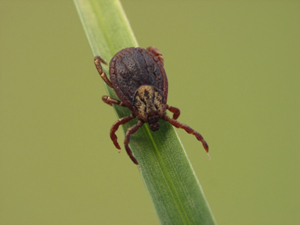Here we are……. Another winter behind us, and (hopefully) many warm months ahead of us. Sadly, we aren’t the only ones who love the warmer weather. So do the parasites and insects!
Things have changed somewhat in our region over the last few years. Canine heartworm is still in the region and will not be eradicated anytime soon due to the ever increasing coyote population and the importation of rescue dogs from southern climates. Heartworm is spread by feeding mosquitoes so all dogs are vulnerable. It causes congestive heart failure, respiratory distress, and sudden death. All dogs should be tested for heartworm every spring and placed on a preventative treatment for the duration of the mosquito season. The heartworm test can be done as part of a wellness blood screen used for the early detection of many diseases. Our staff will be happy to discuss the testing options and prices with you.
Fleas are a hardy parasite that as well as being a nuisance, are a common allergen, and can spread tapeworms. Every year there is a flood of new flea treatments on the market, but we caution you to avoid the over the counter products. Most are ineffective, and are toxins which can sometimes be fatal. Most heartworm preventatives are also highly effective and safe flea treatments, so there may not be any need for you to use other products.
The last few years have seen an exponential surge in the tick population. Most ticks in our area do not carry disease, but some may. The tick which carries Borrelia ( the Lyme Disease bacterium) crossed into Canada about 10 years ago, and is quickly spreading north. The north shore of Lake Ontario, the Ottawa area, and the Niagara Penninsula are all considered endemic for Lyme Disease now. If your dog travels with you to these areas, the Lyme vaccine and tick prevention are highly advised. Even dogs that remain local should be treated with a tick preventative from March to snowfall. If your pet has a tick, notify us and we will advise you how to safely remove it. Your pet should be tested about one month after tick exposure for the tick borne diseases, Borrelia, Anaplasma, and Erlichia.
Intestinal parasites are common and easily transmitted in the summer months. Giardia is a common intestinal parasite that can be transmitted to humans, and is too small to be seen in the stool. Regular testing of your pet’s feces can detect these parasites. We advise checking a sample every spring and fall.
Last year there was a severe kennel cough outbreak in the area just south west of us. Although the kennel cough (or Bordetella) vaccine is generally given to dogs that are boarding or going to doggy daycare, it is now being advised that all dogs should be protected with it. The vaccine is given intranasally, and offers one year of protection.
As mentioned earlier, coyotes are becoming a danger to our domestic pets. Many residents have lost cats and small dogs to these predators. They have become comfortable hunting in our backyards, and you should never leave your pet outdoors unattended at night. Coyotes also share many intestinal parasites and viruses with their domestic cousins, so ensure your pet’s vaccines are up to date. There is no adverse consequences to a high vaccine titre, so it is better to err on the side of caution when it comes to infectious disease.
One last note.. August 21st is our Open House. This is our chance to give you a behind the scenes look at what we do every day…. from surgery to patient care. Please come out and spend an afternoon with us.
We look forward to seeing you and your pet. Bring your questions … medical …. behavioural …… or nutritional. We are here to be your resource for the proper care of your pet. Don’t get lost in the confusing and often misleading information on the internet, from your neighbour or breeder, or from the sales clerk at the pet store. Our staff is highly trained to be able to help you get the answers you need!


